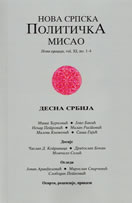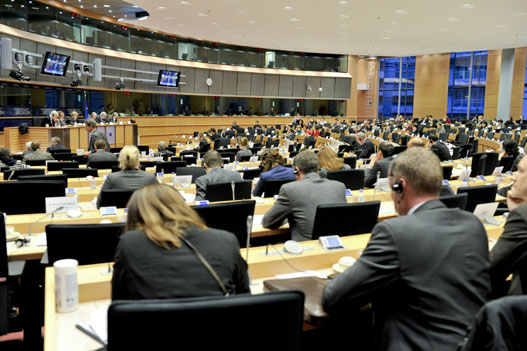| Документи | |||
Резолуција Европског парламента о напретку Србије у 2012. |
 |
 |
 |
| петак, 08. фебруар 2013. | |
|
MOTION FOR A RESOLUTION to wind up the debate on the statement by the Commission pursuant to Rule 110(2) of the Rules of Procedure on the 2012 Progress Report on Serbia (2012/0000(RSP)) Jelko Kacin on behalf of the Committee on Foreign Affairs
The European Parliament, – having regard to the European Council conclusions of 2 March 2012, – having regard to the Stabilisation and Association Agreement (SAA) between the European Communities and their Member States and the Republic of Serbia, to which the European Parliament gave its consent on 19 January 2011 and which is in the final stage of ratification by Member States, and the Interim Agreement on trade and trade-related matters between the European Community and the Republic of Serbia, which entered into force on 1 February 2010, and the regulation of the European Parliament and of the Council concerning certain procedures for applying the EC/Serbia Stabilisation and Association Agreement: procedures for applying the Agreement and the Interim Agreement, – having regard to Council Decision 2008/213/EC of 18 February 2008 on the principles, priorities and conditions contained in the European Partnership with Serbia and repealing Decision 2006/56/EC1, – having regard to the General Affairs Council conclusions of 28 February 2012, – having regard to the Council Conclusions of 25 October 2010 inviting the Commission to prepare its opinion on Serbia’s application for membership of the European Union, the Council Conclusions of 5 December 2011 and the Conclusions of the European Council of 9 December 2011, – having regard to the Commission Opinion of 12 October 2011 on Serbia’s application for membership of the European Union (SEC(2011)1208) and the Commission communication of 12 October 2011 entitled ‘Enlargement Strategy and Main Challenges 2011-2012’ (COM(2011)0666), – having regard to the Commission 2012 Progress Report on Serbia (SWD(2012) 333) of 10 October 2012, – having regard to the Communication from the Commission to the European Parliament and the Council on Enlargement strategy and Main Challenges 2012-2013 of 10 October 2012 (COM(2012) 600), – having regard to UN Security Council Resolution 1244 (1999), to the ICJ Advisory Opinion of 22 July 2010 on the question of the accordance with international law of the unilateral declaration of independence in respect of Kosovo, and to the UN General Assembly Resolution of 9 September 2010, which acknowledged the content of the opinion and welcomed the readiness of the EU to facilitate the dialogue between Belgrade and Pristina, – having regard to the joint statement from the 6th EU-Serbia Inter-Parliamentary Meeting of 27-28 September 2012, – having regard to the EU-Serbia readmission agreement of 8 November 20072 and to Council Regulation (EC) No 1244/2009 of 30 November 2009 amending Regulation (EC) No 539/2001 listing the third countries whose nationals must be in possession of visas when crossing the external borders and those whose nationals are exempt from that requirement, – having regard to the third Commission Report to the European Parliament and the Council on the Post-Visa Liberalisation Monitoring for the Western Balkan Countries in accordance with the Commission Statement of 8 November 2010 published on 28 August 2012 (COM(2012) 472 final), – having regard to Council Decision 2011/361/CFSP of 20 December 2010 on the signing and conclusion of the Agreement between the European Union and the Republic of Serbia establishing a framework for the participation of the Republic of Serbia in European Union crisis management operations, – having regard to the final report of 19 September 2012 by the OSCE ODIHR Limited Election Observation Mission that observed the Serbian Parliamentary and Presidential elections on 6 and 20 May, – having regard to the annual report of 1 August 2012 by the President of the ICTY presented to the UN General Assembly on 15 October 2012, – having regard to its previous resolutions, – having regard to Rule 110(2) of its Rules of Procedure, A. whereas the European Council of 1 March 2012 has granted Serbia the candidate status; B. whereas only one EU Member State has not yet ratified the EU-Serbia Stabilisation and Association Process; C. whereas the new Serbian government has affirmed its commitment to continue to pursue European integration; 1. Welcomes the conduct of the parliamentary, local and early presidential elections held in May 2012, characterised by the OSCE/ODIHR by respect of fundamental rights and freedoms; welcomes the commitment of the new government to a continued EU integration course and highlights the need to deliver reforms; 2. Calls on the Council to set the date for beginning of accession negotiations with Serbia as soon as possible, provided that the key priorities are satisfactorily met and that the reform processes continue; 3. Welcomes the progress made by Serbia towards meeting the political Copenhagen criteria, as recognised in the European Commission 2012 progress report; recalls that further progress in the European integration process is dependent on pursuing the path of reforms; stresses that implementation is key; 4. Expresses concern about the changes to the Law on Central Bank, which undermined its independence, and about the overall freedom of state institutions from undue influence by the executive branch of the government; underlines that Copenhagen political criteria include independence of state institutions; 5. Welcomes Serbia's cooperation with the ICTY and that all war crimes suspects have been handed over to The Hague Tribunal; shares the repeated calls by the ICTY Chief Prosecutor to conduct thorough investigation into and prosecution of persons engaged in the support networks which enabled fugitives to remain at large for so long, particularly in the military and civilian security services; 6. Welcomes the resumption of the Belgrade-Pristina Dialogue at high political level and the engagement expressed by the new Serbian government; calls for full implementation of the agreements reached so far by both parties; considers that the issue of missing persons needs to be included in the dialogue at the highest political level; 7. Welcomes government's commitment to tackle shortcomings in the reform of the judiciary, particularly ensuring that the legal framework does not leave room for undue political influence, addressing parliament's power to appoint judges and prosecutors and the direct participation of political functionaries in the work of the High Judicial and the State Prosecutorial Councils; underlines the importance of adopting clear and transparent evaluation criteria for the appointed judges and prosecutors that will ensure their independence and professionalism; 8. Takes note of the effort by the new government to address the concerns expressed by the European Parliament regarding the call for immediate revision of Article 359 of the Criminal Code; emphasizes the need to tackle the problem of asset freeze which accompanied detention of persons based on the Article 359 and further aggravated the state of the Serbian economy; 9. Welcomes government's commitment to fight corruption and organized crime; emphasizes that political will is crucial for the success of investigations of high profile corruption cases, including the 24 controversial privatizations, and hopes that the special and proactive role of the First Deputy Prime Minister in this area will bear fruit; calls on the authorities to fully implement the law on political parties financing that should ensure transparency thereof and alignment with EU standards; 10. Recalls that vigorous, professional and independent media is an essential element of a democratic system; calls on the authorities to secure freedom of the media inter alia by addressing the continued violence and threats against journalists, solving the cases of murdered journalists from the 1990's and 2000's, by ensuring the independence of the media from political pressure and providing them with a safe environment to conduct their work, by addressing the issue of concentration of media ownership; stresses the need to speed up the implementation of the Media Strategy adopted in October 2011 and its accompanying action plans; calls on journalists to respect the Code of Ethics; 11. Emphasises the importance of fight against discrimination in all forms and against all vulnerable groups; calls on the authorities to swiftly align the anti-discrimination legislation with the acquis and establish a track record of prosecutions and final convictions for related offences; 12. Condemns the government's decision to ban the Gay Pride Parade which was supposed to take place on 6 October 2012; 13. Welcomes the generally good status of national, ethnic and cultural minorities in Serbia; calls on the authorities to improve implementation of the legislation on protection of minorities, particularly with regard to fair representation of minorities in public administration, judiciary and police, information and education in minority languages, including the provision of all the necessary textbooks; 14. Takes note of some improvement in the position of the Roma population, and the measures taken to increase their social inclusion; expresses concern about the continued discrimination, social exclusion and high unemployment, particularly of Roma women; 15. Welcomes progress in reforms of the child-care system and the continued implementation of the 2011 Social Welfare Law; is concerned about the growing number of children in care and particularly about the slow decrease in numbers of children with disabilities in institutions; 16. Reaffirms its staunch support to visa liberalisation for Western Balkan countries; calls on Serbia and EU Member States mostly affected to tackle together the issue of bogus asylum applicants; 17. Stresses the central role of civil society for strengthening and consolidation of democratic political processes in the country; 18. Reiterates the central importance of regional cooperation and good neighbourly relations for the success of Western Balkan countries' European integration process; welcomes the work carried out on reconciliation and stresses that Serbia should continue to play an active and constructive role in the region; 19. Stresses that all war crimes and human rights violations during the 1990's conflicts in the former Yugoslavia should not be denied by any public official; 20. Welcomes the official visit by Prime Minister Ivica Dačić to Bosnia and Herzegovina and the official support for the territorial integrity and sovereignty of BiH; 21. Welcomes the improvement in relations between Croatia and Serbia; urges authorities of both countries to make further efforts to resolve the issue of missing persons; 22. Welcomes the improvements in relations between Montenegro and Serbia; calls for tighter coordination between respective governments on EU-related reforms, in particular to address joint challenges to the rule of law; encourages both governments to step up their efforts to find a solution for the remaining border issues; 23. Welcomes the agreement reached between Serbia and Macedonia on the free movement of citizens in addition to the agreements already signed by Serbia; 24. Encourages the authorities to take steps towards establishing a fully functional market economy; recalls that the existence of state and private monopolies severely hampers the transition towards an open market economy and calls on the government to take measures to abolish them; underlines the importance of removing red tape; 25. Calls on the authorities to swiftly proceed with creating conditions for a genuine social dialogue; draws attention to shortcomings in the Law on Labour which has not been brought in line with the acquis; *** 26. Instructs its President to forward this resolution to the Council, the Commission and the Government and Parliament of Serbia. |

.jpg)























